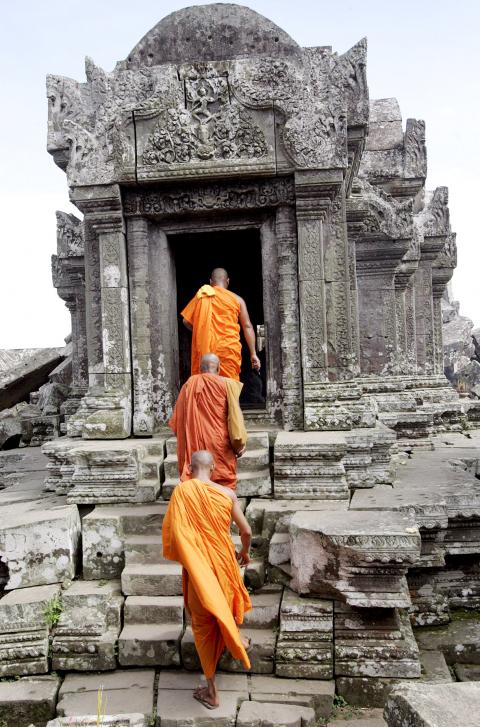The UN’s top court ruled yesterday that the area around a flashpoint ancient temple on the Thai border belongs to Cambodia and that any Thai security forces there should leave.
The International Court of Justice (ICJ) interpreted a 1962 ruling saying that “Cambodia had sovereignty over the whole territory of the promontory of Preah Vihear,” Judge Peter Tomka said.
“In consequence, Thailand was under an obligation to withdraw from that territory Thai military or police forces or other guards or keepers who were stationed there,” Tomka said.

Photo: EPA
At least 28 people have been killed in outbreaks of violence since 2011 over the ownership of the patch of border land next to the 900-year-old Preah Vihear Temple.
“It’s good enough,” Cambodian Minister of Foreign Affairs Hor Namhong, who was at the hearing in The Hague, told reporters.
Last year, the court ruled that both countries should withdraw forces from around the ancient Khmer temple, which is perched on a clifftop in Cambodia, but is more easily accessed from the Thai side.
Cambodia and Thailand finally pulled hundreds of soldiers from the disputed zone in July last year, replacing them with police and security guards.
Ahead of the ruling by the Netherlands-based court, there were fears that the decision would revive nationalist tensions and spark renewed clashes.
Tens of thousands of people were displaced in the 2011 fighting, leading Cambodia to ask the court for an interpretation of an original 1962 ruling.
Thailand does not dispute Cambodia’s ownership of the temple, a UNESCO World Heritage site, but both sides laid claim to an adjacent 4.6km2 piece of land.
Leaders of the two countries appealed for calm before the ruling by 17 international judges.
The court’s decision is binding and cannot be appealed.
The mood on both sides of the temple was tense ahead of the verdict, with tourists still allowed to visit the ancient structure via Cambodian territory, but journalists denied access.
The Cambodian army denied local media reports that it had sent military reinforcements to the area.
On her Facebook page, Thai Prime Minister Yingluck Shinawatra vowed on Sunday to “consult” with Cambodia after the decision to avoid any conflict, adding that her government would make a statement following the verdict.
The ruling, which was broadcast live on Thai TV, is fraught with danger for her government, which is already grappling with mass street demonstrations against a controversial political amnesty bill.
The country’s opposition is now likely to direct public anger toward Yingluck, whose divisive brother, former Thai prime minister Thaksin Shinawatra, is close to Cambodian Prime Minister Hun Sen.

PRECARIOUS RELATIONS: Commentators in Saudi Arabia accuse the UAE of growing too bold, backing forces at odds with Saudi interests in various conflicts A Saudi Arabian media campaign targeting the United Arab Emirates (UAE) has deepened the Gulf’s worst row in years, stoking fears of a damaging fall-out in the financial heart of the Middle East. Fiery accusations of rights abuses and betrayal have circulated for weeks in state-run and social media after a brief conflict in Yemen, where Saudi airstrikes quelled an offensive by UAE-backed separatists. The United Arab Emirates is “investing in chaos and supporting secessionists” from Libya to Yemen and the Horn of Africa, Saudi Arabia’s al-Ekhbariya TV charged in a report this week. Such invective has been unheard of

US President Donald Trump on Saturday warned Canada that if it concludes a trade deal with China, he would impose a 100 percent tariff on all goods coming over the border. Relations between the US and its northern neighbor have been rocky since Trump returned to the White House a year ago, with spats over trade and Canadian Prime Minister Mark Carney decrying a “rupture” in the US-led global order. During a visit to Beijing earlier this month, Carney hailed a “new strategic partnership” with China that resulted in a “preliminary, but landmark trade agreement” to reduce tariffs — but

SCAM CLAMPDOWN: About 130 South Korean scam suspects have been sent home since October last year, and 60 more are still waiting for repatriation Dozens of South Koreans allegedly involved in online scams in Cambodia were yesterday returned to South Korea to face investigations in what was the largest group repatriation of Korean criminal suspects from abroad. The 73 South Korean suspects allegedly scammed fellow Koreans out of 48.6 billion won (US$33 million), South Korea said. Upon arrival in South Korea’s Incheon International Airport aboard a chartered plane, the suspects — 65 men and eight women — were sent to police stations. Local TV footage showed the suspects, in handcuffs and wearing masks, being escorted by police officers and boarding buses. They were among about 260 South

Chinese President Xi Jinping’s (習近平) purge of his most senior general is driven by his effort to both secure “total control” of his military and root out corruption, US Ambassador to China David Perdue said told Bloomberg Television yesterday. The probe into Zhang Youxia (張又俠), Xi’s second-in-command, announced over the weekend, is a “major development,” Perdue said, citing the family connections the vice chair of China’s apex military commission has with Xi. Chinese authorities said Zhang was being investigated for suspected serious discipline and law violations, without disclosing further details. “I take him at his word that there’s a corruption effort under